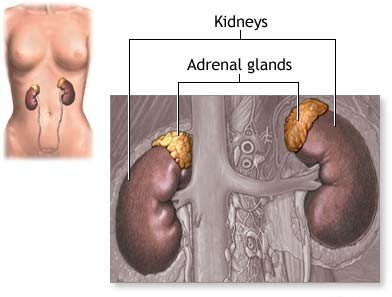Diseases of the Adrenal Gland
The adrenal glands are small glands located above each kidney. They are endocrine glands that produce a variety of hormones. The hormones are important in controlling our blood pressure, water balance, chemical balance, glucose and our “fight or flight” reaction. The hormones produced include cortisol, aldosterone, epinephrine, and norepinephrine and various other catecholamines. The adrenal gland also produces some of your body’s sex hormones.
Adrenal Gland Symptoms
Adrenal gland problems usually occur when a mass or a tumor forms on the gland. Most masses are benign and do not require surgery. There are a variety of symptoms related to functional adrenal masses or those that produce hormones. Pheochromocytomas produce excess hormones that can cause high blood pressure, headaches, sweating, anxiety, palpitations and a rapid heart rate.
Aldosterone producing tumors can cause high blood pressure and low potassium levels. This sometimes causes weakness, fatigue and frequent urination. Cushing’s syndrome is the result of overproduction of cortisol. Usual symptoms are obesity, high blood sugar, high blood pressure, menstrual irregularities and fragile skin.
Adrenal Gland Surgery/Laparoscopic Adrenalectomy
Here at Suncoast Surgical Associates, we are trained to perform this surgery through a minimally invasive laparoscopic technique as opposed to the conventional open surgery which requires a much larger incision. This technique uses only three to four small incisions and will reduce postoperative pain, quicker return to full activity, decrease hospital stay, minimize scarring and reduce the chances of infection.
It is almost always necessary to remove the entire gland, not just the tumor in order to safely perform the surgery.
Preparing for Adrenal Gland Surgery
You will either have a phone or in-person interview with the hospital anesthesia team to discuss your procedure, notify you of medications you should stop or take the day of surgery and let you know what time you should come in for your surgery. You will be asked to come in a couple hours earlier than your schedule surgery time.
Patients with pheochromocytoma will need to be started on special medications several days prior to surgery to control their blood pressure and heart rate. Patients with aldosterone problems may need to have potassium levels checked and take extra potassium if the level is low.
Patients with Cushing Syndrome will need to receive extra doses of cortisone medication on the day of surgery and for a few months afterwards until the remaining adrenal gland has resumed normal function. On the day of your surgery:
No eating or drinking after midnight the night before
Take any drugs your doctor said you may take with a sip of water
Shower the night before or morning of your surgery
After Adrenal Gland Surgery (Adrenalectomy)
Most patients leave the hospital in one to two days after surgery. You will be directed as to your new medication regimen as it often changes once the tumor has been removed. Patients can remove dressings and shower the day after the operation. Patients can usually resume normal activities within a week after surgery.



